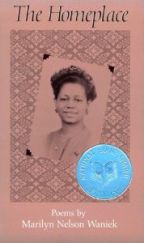
In The Homeplace, the stories of a family become the history of a people as Marilyn Nelson Waniek sketches the lives descended from her great-great-grandmother Diverne.
The poet’s mother, Johnnie Mitchell Nelson, inspired this volume when she bequeathed to Waniek from her deathbed the tales that had shaped her life. The first section of the book presents those stories transformed into graceful, humorous, and deeply touching poems.
Here is “Chosen,” about the slave Diverne and the beginnings of the Atweed family:
Diverne wanted to die, that August night
his face hung over hers, a sweating moon.
She wished so hard, she killed part of her heart.If she had died, her one begotten son,
her life’s one light, would never have been born.
Pomp Atwood might have been another man:born with a single race, another name.
Diverne might not have known the starburst joy
her son would give her. And the man who cameout of a twelve-room house and ran to her
close shack across three yards that night, to leap
onto her cornshuck pallet. Pomp was theirshare of the future. And it wasn’t rape.
In spite of her raw terror. And his whip.
In the book’s second section Waniek honors her late father, Melvin Nelson, and tells the story of his “family”: the fabled group of black World War II aviators known as the Tuskegee Airmen. Using the language and perspective of her father and his comrades, Waniek explores through a few of their individual stories the hardships and achievements of the thousand black flyers trained at Tuskegee Institute.
The opening lines of “Porter” express the poet’s feelings for these men:
Suddenly
when I hear airplanes overhead—
big, silver ones
whose muscles fill the sky—
I listen: That sounds like
someone I know.
And the sky
looks much closer.
Throughout The Homeplace, the reader is involved in a series of sharply portrayed lives. By telling a continuous story in a mix of free verse and traditional forms, Waniek gives her work pace and intensity. She handles the villanelle, the sonnet, and the popular ballad with equal skill and gusto.
“I just knew we were going to live some history,” Johnnie Nelson said at the end of her life. Her daughter has produced an eloquent homage to that history, celebrating the survival of Afro-American pride.
Marilyn Nelson is the author of numerous books, including The Cachoeira Tales and Other Poems, The Fields of Praise, and Magnificat. Her honors include three National Book Award Finalist medals, the Frost Medal, the Poets’ Prize, and the Boston Globe/Hornbook Award. Nelson is an emeritus professor at the University of Connecticut, the former poet laureate of Connecticut, and founder and director of Soul Mountain Retreat.
Found an Error? Tell us about it.